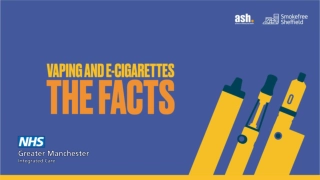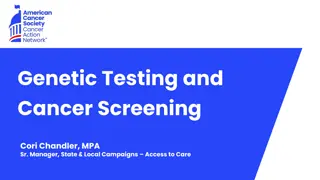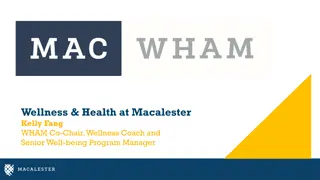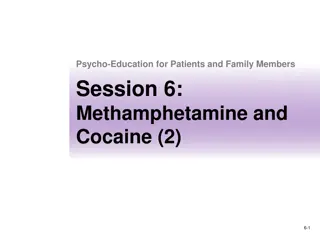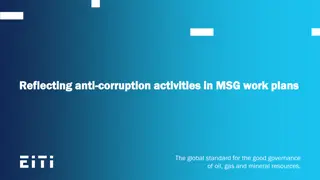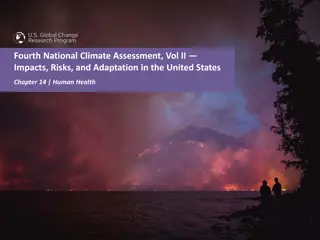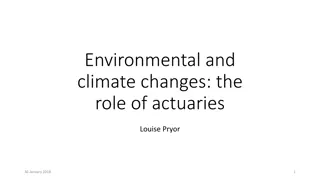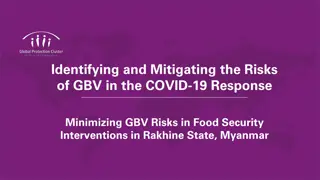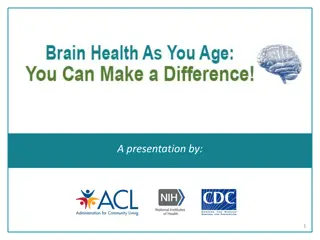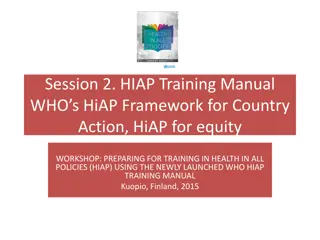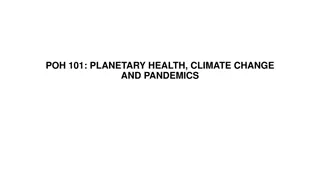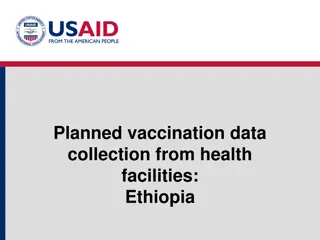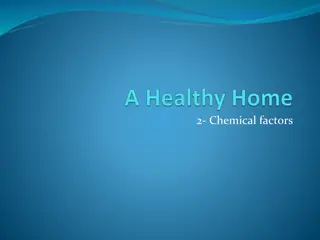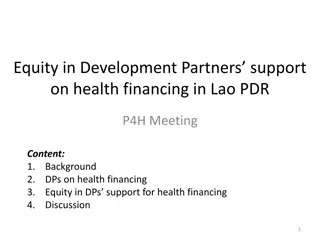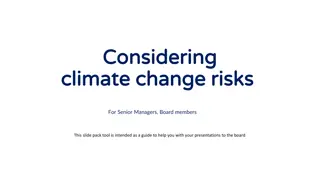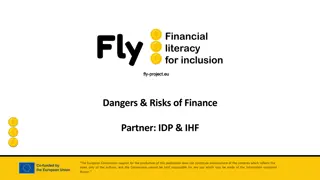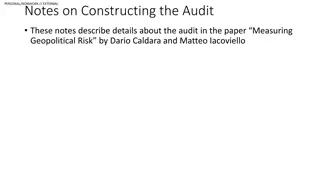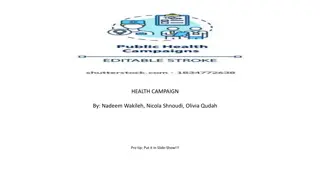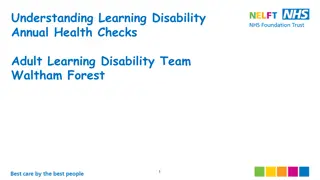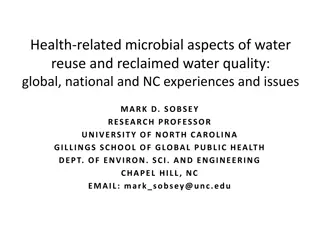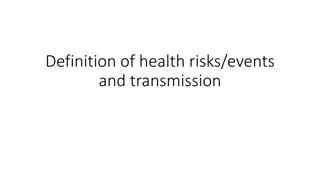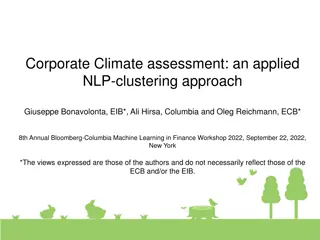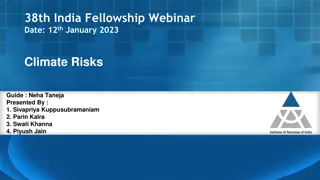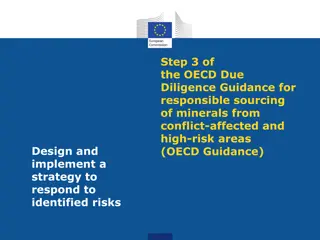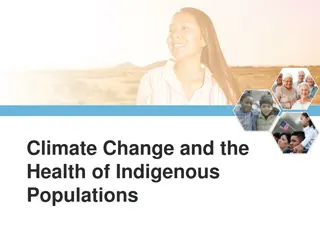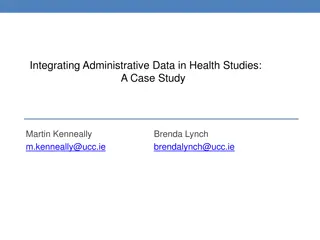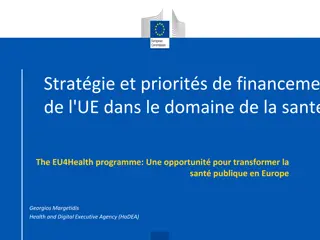Long-term Health Risks Among Children HIV-Exposed
Study comparing risks of hospitalization and chronic diseases in HIV-exposed uninfected children vs. population control in Montreal, Canada. Data indicates heightened risks in CHEU including bacterial infections, mortality, hospitalization, poor growth, psychiatric disorders, and neurological outcom
0 views • 25 slides
The Truth About Vaping: Health Risks and Environmental Impact
Vaping, seen as a safer alternative to smoking, comes with its own set of risks. While it can help adult smokers quit, it is not without consequences. Short-term effects like coughing and headaches, coupled with unknown long-term impacts, raise concerns. Furthermore, the environmental impact of disp
124 views • 23 slides
Managing Power Platform Risk with an Environment Strategy by Frank Shink, Senior Power Platform Design Engineer at Ameriprise Financial
Frank Shink, a seasoned professional, delves into the risks associated with Power Platform, from development risks to cost risks, and offers insights on tools and strategies to combat these risks effectively. He emphasizes the importance of environments, DLP policies, and licensing strategies in mit
1 views • 20 slides
Risks Associated with Health-Relevant Neophytes and Neozoa
Understanding the health risks posed by health-relevant neophytes and neozoa is crucial, especially as climate change continues to impact ecosystems. Allergies and infections are on the rise due to changing climate conditions, leading to new health challenges. Neophytes like Parietaria officinalis a
1 views • 24 slides
Understanding Genetic Testing and Cancer Screening
Genetic testing involves the analysis of germline genes to determine the risk of developing certain cancers or passing on risks to offspring. It can provide valuable insights into cancer risks, help inform relatives about potential risks, but may have limitations and risks such as cost and insurance
0 views • 10 slides
Wellness and Health Program Overview at Macalester College
Kelly Fang, the Co-Chair of WHAM at Macalester College, leads a comprehensive wellness and health program offering incentives for participants to improve their well-being. The program includes wellness rewards, health assessments, and data analysis on participant risk factors and health behaviors. P
0 views • 21 slides
Understanding New Psychoactive Substances (NPS) and Their Categories
New Psychoactive Substances (NPS) are substances of abuse not regulated by international drug conventions, posing significant public health risks. These substances can fall under categories like synthetic cannabinoids, stimulants, hallucinogens, and depressants, each with unique risks and effects. S
0 views • 11 slides
Risks and Effects of Methamphetamine, Cocaine, and Shabu Abuse
Understanding the dangers associated with methamphetamine, cocaine, and shabu abuse is crucial. Shabu is not pure methamphetamine and contains harmful impurities, while injecting, snorting, or smoking it can lead to various health risks. Methamphetamine abuse can result in severe physical and mental
0 views • 23 slides
Enhancing Anti-Corruption Activities in Extractive Sector Work Plans
Reflecting on anti-corruption activities in MSG work plans is crucial for good governance of oil, gas, and mineral resources. The EITI provides guidance on addressing corruption risks, with a recommended three-step approach: assess risks, develop an activity plan, and monitor results. Step 1 involve
0 views • 11 slides
Impacts of Climate Change on Human Health in the United States
Climate change poses a significant threat to the health and well-being of Americans, with adverse consequences projected to worsen. It impacts human health by increasing exposure to extreme events, infectious diseases, and air, food, and water quality changes. Vulnerable populations, including child
0 views • 12 slides
The Role of Actuaries in Addressing Environmental and Climate Changes
Actuaries play a crucial role in assessing and managing risks posed by environmental and climate changes, aiding the insurance industry in mitigating these challenges. They consider long-term risks with significant financial implications, such as physical, transitional, and liability risks. Actuarie
0 views • 20 slides
Banking Risks and Responses in Today's Financial Landscape
Anjan Thakor, Interim Dean at Wash U. Olin Business School, discusses various banking risks such as tension between fiscal and monetary policies, cyber security, rising consumer indebtedness, war and geopolitical risks, and more. The article explores how these risks can become systemic and suggests
7 views • 7 slides
Identifying and Mitigating GBV Risks in COVID-19 Response for Food Security in Rakhine State, Myanmar
Rakhine State faces challenges of conflict, displacement, and restricted movement, with many relying on food assistance. Cash assistance implementation did not escalate GBV risks. The COVID-19 restrictions heightened the need for adjustments in programming, requiring monitoring of assistance changes
0 views • 5 slides
Understanding Artificial Intelligence Risks in Short and Long Term
This content delves into the risks associated with artificial intelligence, categorizing them into short-term accident risks and long-term accident risks. Short-term risks include issues like robustness problems and interruptibility, while long-term risks focus on competence and alignment challenges
0 views • 15 slides
Maintaining Brain Health and Cognitive Function: Key Factors and Risks
Aging well and maintaining brain health require a combination of genetic, environmental, and lifestyle factors. While age-related changes in memory and learning may occur, adopting a healthy lifestyle, avoiding risks like smoking and excessive alcohol use, and being aware of how medicines can impact
0 views • 23 slides
WHO's HiAP Framework and Global Mandates for Health Equity
This content discusses the HiAP Framework for Country Action and Global Mandates for promoting health equity. It covers resolutions, declarations, and recommendations by various organizations to address social determinants of health and reduce health inequities. The WHO Director-General is urged to
0 views • 11 slides
Understanding Planetary Health, Climate Change, and Pandemics
This educational content delves into the concepts and principles of planetary health and climate change, exploring the interrelationships between ecosystems, animals, and human health. It highlights the far-reaching effects of human and animal interactions on the environment, emphasizing practical i
0 views • 20 slides
Vaccination Data Collection and Health Care System in Ethiopia
Planned vaccination data collection is underway in health facilities in Ethiopia, with teams visiting Enumeration Areas and health centers to ensure children are vaccinated. The health care system in Ethiopia includes Health Centers at regional, zonal, and woreda levels, staffed with health officers
0 views • 9 slides
Chemical Factors: Carbon Monoxide Poisoning and Smoking Risks
Chemical factors such as carbon monoxide poisoning from indoor sources like tobacco smoking and poorly ventilated appliances can lead to serious health risks. Recognizing the signs of CO poisoning, understanding the dangers of cigarette smoke, and addressing the addictive nature of smoking are cruci
0 views • 17 slides
Importance of Health and Safety in the Workplace
Health and safety are crucial for all employees, as outlined in the Ontario Health and Safety Act. Employers and employees share the responsibility of creating a safe work environment through enforcement, compliance, and partnership. Understanding hazards, both safety and health-related, is key in p
0 views • 24 slides
Equity in Development Partners Support on Health Financing in Lao PDR P4H Meeting
The meeting focuses on addressing health indicators, inequities, and health financing challenges in Lao PDR. It analyzes the background of health indicators, inequities by socio-economic status and ethnic groups, and the current health financing situation in the country. The discussion delves into s
0 views • 23 slides
Perceived Risks and Risks Mitigation Practices in Informal Waste Workers: A Qualitative Study
A qualitative study conducted in Kathmandu Valley exploring the perceived risks and mitigation practices of informal waste workers. The research project, led by Sujata Sapkota, aims to address the occupational and health challenges faced by these workers. The study includes a mix of quantitative and
0 views • 22 slides
Managing Financial Risks in a Changing Climate Environment
Assessing climate-related and environmental risks is vital for ensuring the safety and soundness of financial institutions. These risks include physical risk drivers like extreme weather events and transition risk drivers related to policy measures and technological changes. The complexity and uncer
0 views • 11 slides
Addressing Climate Change Risks: Guidance for Senior Managers and Board Members
This slide pack tool provides guidance on addressing climate change risks for senior managers and board members. It covers key messages such as understanding obligations and gaps, identifying climate change risks, exploring responsibilities, and implementing actions to address these risks effectivel
0 views • 11 slides
Understanding Financial Risks and Mitigation Strategies
Explore the concept of financial risks, learn how to identify and mitigate them, and improve your financial decision-making skills. This module covers definitions, typical risks, and strategies to safeguard your finances. Discover the four main clusters of financial risks and how to implement counte
0 views • 17 slides
Insights on Constructing Geopolitical Risk Audit
Details on constructing the audit for the paper "Measuring Geopolitical Risk" by Dario Caldara and Matteo Iacoviello are outlined. It covers the process of building the GPR index, designing the audit sample, and coding articles to identify geopolitical risks discussed in newspapers. The methodology
0 views • 17 slides
Understanding the Risks of Smoking and How to Quit
Smoking is a prevalent but harmful practice worldwide, with immediate adverse effects on one's health. Nicotine addiction and exposure to toxic chemicals in tobacco smoke increase the risk of various diseases and impact one's overall well-being. To reduce these risks, quitting smoking is the best op
0 views • 7 slides
Enterprise Risk Management (ERM) Strategies for Mitigating Key Business Risks
Enterprise Risk Management (ERM) is a crucial strategic discipline that involves prospectively identifying, managing, and mitigating risks to reduce uncertainties and ensure organizational objectives are met. Risk rankings, mitigation strategies, and lead roles are outlined in the SJIEMS 2017 ERM Re
0 views • 38 slides
Understanding Annual Health Checks for People with Learning Disabilities
Annual Health Checks (AHC) are essential for individuals over 14 years old with learning disabilities to review their physical and mental health. Conducted by GPs or health professionals, these checks help in detecting, treating, and preventing new health conditions. By being on the learning disabil
0 views • 8 slides
Understanding Health Risks in Reclaimed Water and Water Reuse
Exploring the microbial aspects of reclaimed water and wastewater reuse is crucial for public health. Pathogenic microorganisms present in wastewater, such as bacteria, viruses, and parasites, can lead to gastrointestinal and systemic illnesses in humans. Proper removal and inactivation of these pat
0 views • 25 slides
Understanding Health Education and Promotion Concepts
Health education is the process through which individuals and groups learn to promote, maintain, and restore health while addressing risks and preventing diseases and injuries. Health promotion involves planned actions to improve living conditions conducive to health, empower individuals, and create
0 views • 29 slides
Understanding the Risks of Cheap Natural Gas and Hydraulic Fracking
This introduction delves into the multifaceted risks associated with the exploitation of cheap natural gas and hydraulic fracking. Covering climate risks, economic consequences of petro-states, direct GHG risks, and local environmental risks, the content underscores the complex challenges and implic
0 views • 8 slides
Understanding Health Risks, Events, and Disease Transmission
Explore the interconnectedness between human health, animal health, and the environment while delving into how diseases spread, the infection cycle, and vulnerability to epidemics. Learn how volunteers can help prevent epidemics, recognize symptoms of health risks, and discuss why it's important to
0 views • 57 slides
Understanding Corporate Climate Assessment Using NLP Clustering
This work explores a novel approach in corporate climate assessment through applied NLP clustering, highlighting the relationship between climate risk and financial implications. The use of advanced techniques like BERT embedding for topic representation and clustering in corporate reports is discus
0 views • 33 slides
Understanding Climate Risks in India: Insights from the 38th India Fellowship Webinar
Explore the impacts of climate risks in India through the lens of physical and transition risks detailed during the 38th India Fellowship Webinar on January 12, 2023. Key topics include climate change interactions, liability risks, and risk management strategies for a sustainable future.
0 views • 37 slides
Scottish Public Health Observatory: Enhancing Health Information for Better Decision Making
The Scottish Public Health Observatory collaborates with NHS National Services Scotland to provide health information, intelligence, and statistical services supporting NHS in enhancing quality improvement in health care. They analyze national health data to improve population health and reduce heal
0 views • 16 slides
Responding to Risks in OECD Due Diligence Guidance
Develop and implement a strategic response to identified risks in accordance with the OECD Due Diligence Guidance for responsible sourcing of minerals. The process involves reporting findings to management, devising a risk management plan, implementing the plan, and assessing ongoing risks. Mitigati
0 views • 7 slides
Impact of Climate Change on Indigenous Health in the United States
Climate change poses significant risks to the health of Indigenous populations in the United States. The US Climate Health Assessment highlights these risks and emphasizes the vulnerability of tribal communities. Factors such as food insecurity, water scarcity, and air quality issues exacerbate exis
0 views • 9 slides
Integrating Administrative Data in Health Studies: A Case Study
This case study explores the integration of administrative data in health studies focusing on profiling the health status of Irish regions in 2010. The objectives include linking regional health profiles to prescribing patterns, incorporating demographics and drug scheme coverage rates, and simulati
0 views • 17 slides
EU4Health Programme: Transforming Public Health in Europe
The EU's financial strategy and priorities in the health domain are highlighted through the EU4Health programme, aiming to enhance public health in Europe. The HaDEA is actively involved in improving health in the Union, protecting against cross-border health threats, ensuring availability of afford
0 views • 11 slides

